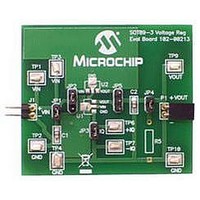SOT89-3EV-VREG Microchip Technology, SOT89-3EV-VREG Datasheet - Page 12

SOT89-3EV-VREG
Manufacturer Part Number
SOT89-3EV-VREG
Description
BOARD EVAL SOT89-3 VOLTAGE REG
Manufacturer
Microchip Technology
Datasheets
1.SOT89-3EV-VREG.pdf
(24 pages)
2.SOT89-3EV-VREG.pdf
(26 pages)
3.SOT89-3EV-VREG.pdf
(28 pages)
4.SOT89-3EV-VREG.pdf
(22 pages)
5.SOT89-3EV-VREG.pdf
(22 pages)
Specifications of SOT89-3EV-VREG
Channels Per Ic
1 - Single
Regulator Type
Positive Fixed
Board Type
Partially Populated
Utilized Ic / Part
SOT-89-3 Package
Silicon Manufacturer
Microchip
Application Sub Type
Voltage Regulator
Kit Application Type
Power Management - Voltage Regulator
Silicon Core Number
MCP1700A, MCP1701A, MCP1702, MCP1703
Lead Free Status / RoHS Status
Lead free / RoHS Compliant
Current - Output
-
Voltage - Output
-
Voltage - Input
-
Operating Temperature
-
Lead Free Status / Rohs Status
Lead free / RoHS Compliant
SOT89-3 Voltage Regulator Evaluation Board User’s Guide
DS51796A-page 8
2.3.2
When measuring ground current, jumper JP3 should be removed, otherwise leave
jumper JP3 on. To measure ground current, perform the following steps:
1. Add desired load resistor to R5.
2. Remove jumpers JP3 and JP4.
3. Connect an ampere meter across testpoints TP6(+) and TP7(-). Select the
4. Connect a voltmeter across testpoints TP9(+) and TP10(-).
5. Add jumper JP1.
6. Apply source voltage to testpoints TP1(+) and TP2(-).
7. Verify the voltage across testpoints TP6 and TP7 is within the expected range of
8. Read the Ground Current directly from the ampere meter connected to testpoints
9. Vary the input voltage to obtain data for ground current versus input voltage. With
10. Add the load selection jumper, JP4.
11. Read the Ground Current directly from the ampere meter connected to testpoints
12. The data collected will be the ground current versus load current.
2.3.3
R5 is used to set the desired load value. One choice is to set R5 to the minimum current
desired for testing.
2.3.4
Dynamic Line Step response may be evaluated by connecting an electronically
switched input voltage to testpoints TP1(+) and TP2(-) or to connector J1. An
oscilloscope is connected to TP3(Ch1 Trigger), TP9(Ch2) and TP10(Gnd). An
appropriate load is selected using R5 and JP4. The input voltage is then electronically
switched from a low voltage to a high voltage. The corresponding voltage waveform
data of the voltage regulator response is captured by the oscilloscope. Microchip will
be offering a Line Step module, Part #: 102-00196, that connects directly to connector
J1. The Line Step module will be capable of switching between two voltage levels that
the user supplies.
2.3.5
Dynamic Load Step response may be evaluated by connecting an electronically
switched load to testpoints TP9(+) and TP10(-) or to connector P1. An oscilloscope is
connected to the electronic load switch signal (Ch1 Trigger) and to TP9(Ch2) and
TP10(Gnd). The load is then electronically switched from a high resistance to a low
resistance. The corresponding voltage waveform data of the voltage regulator
response is captured by the oscilloscope. Microchip will be offering a Load Step
module, Part #: 102-00197, that connects directly to connector P1. The Load Step
module will have several selectable load values populated onboard to cover a wide
range of loads. The load will have the ability to be electronically or manually switched.
appropriate meter scale for the device being evaluated.
the device being tested.
TP6 and TP7.
no load attached to the output of the voltage regulator, the measured ground
current is also called the quiescent current of the regulator.
TP6 and TP7.
Ground Current and Quiescent Current
Load Resistance
Line Step
Load Step
© 2009 Microchip Technology Inc.











